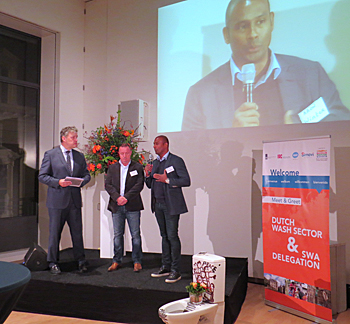IRC and Simavi call for universal access to water also in schools, clinics and at work
 Two Dutch non-governmental organisations, IRC and Simavi, want the post-2015 Sustainable Development Goal (SDG) on universal access to water and sanitation to be expanded to schools, clinics and work place.
Two Dutch non-governmental organisations, IRC and Simavi, want the post-2015 Sustainable Development Goal (SDG) on universal access to water and sanitation to be expanded to schools, clinics and work place.
The pledge was announced during a meet & greet event with the steering commission of the Sanitation and Water for All (SWA) in the Hague, the Netherlands, on 4 December.
The SWA steering commission was in the Netherlands for an informal meeting.
No toilets in factories
"Factory owners do not like their employees to go to the toilet. Therefore many textile factories in Bangladesh lack sanitation facilities", told Dibalok Singha (right on top photo), CEO at the Bengali health care organization Dushtha Shasthya Kendra (DSK) during the meet & greet event.
Singha emphasized that a working day of 16 hours is very normal in a textile factory. He plead for better labour standards, including proper sanitation facilities.
Water goal lacks critical components
In September 2015 the United Nations will formally adopt a new set of global development goals for 2016-2030. IRC and Simavi welcome that access to water, sanitation and hygiene has been suggested as one of the SDG goals, however they miss critical components, such as water and sanitation at work, in clinics and schools.
"We campaign for a dedicated goal on water and sanitation in the follow-up of the Millennium Development Goals after 2015”, said Andy Palmen, director Partnership Development at Simavi. “And we want this access to water, sanitation and hygiene to be extended beyond homes to schools, healthcare facilities and the work place.”
Palmen: "We call on governments, including the Dutch government to show more ambition in the area of water, sanitation and hygiene."
 Former Ajax and Inter Milan football player Aron Winter tells how football coaches learn school kids in Kenya,Ghana and Mozambique to wash their hands.
Former Ajax and Inter Milan football player Aron Winter tells how football coaches learn school kids in Kenya,Ghana and Mozambique to wash their hands.
Five WASH-cases
During the meet & greet event five case were presented that showed the importance of water and sanitation in schools, hospitals and in the workplace:
● Football for water
Programme for schools in Kenya, Ghana and Mozambique where world famous soccer players learn school kids to play football and teach them on life skills, such as washing their hands.
● Menstrual hygiene management
Study on the impact of menstrual hygiene on school girls in Uganda that lead to the First National Menstrual hygiene management conference in Kampala in August 2014.
● PeePoo school
Programma to provide schools in the Kibera slums of Nairobi with Peepoo toilets, a single-use, self-sanitising and bio-degradable toilet that turns into fertilizer after only one month. The school kids learn to use the fertiliser for growing crops in their school gardens.
● WASH at the workplace
Pledge by the World Business Council for Sustainable Development (WBCSD) for the business community to provide proper WASH-facilities at the workplace. So far 19 international companies, including Unilever, Sabic, Nestlé, Michelin and Roche, signed the call.
● Upgrade health facilities
Programme to upgrade water supply and sanitation systems in 100 primary health facilities in Dodoma region, Tanzania.
Read the two-page paper by Simavi and IRC on the importance of water and sanitation in schools, clinics and at the workplace.
This news item is based on publication on the websites of IRC and Simavi.
More information
IRC
The Hague, the Netherlands
+31 70 304 4000
www.ircwash.org
Simavi
Haarlem, the Netherlands
+31 23 531 80 55
www.simavi.nl
Video presentation of the Menstrual hygiene management project in Uganda.



